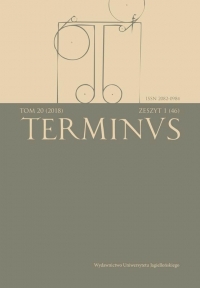„Aby każdy miłośnik prawdy onej szukając, z czytania jej dojść mógł”. Sposoby uwiarygodniania przekazu w szesnastowiecznych relacjach z polskich dysput wyznaniowych
“May every lover of truth find it through reading.” Manners of Authenticating the Message in Sixteenth-Century Accounts of Polish Religious Disputations
Author(s): Magdalena Ryszka-KurczabSubject(s): Cultural history, Social history, 17th Century
Published by: Wydawnictwo Uniwersytetu Jagiellońskiego
Keywords: Polish religious disputations; accounts of disputations; early modern period;authenticating accounts; rhetorical strategies; dialectics
Summary/Abstract: In the 16th and 17th centuries, religious disputations became one of the means of conducting religious agitation. Texts providing an account of the course of such events confirm the application of the formal rules of school-type disputatio in public disputes using vernacular language. This undoubtedly resulted in the expansion of the audience at such spectacles beyond scholars conversant in Latin and influenced the change of the objectives of such debates, from a collective search for the truth to the defence of one’s own doctrine using all available methods, that is, dialectics and rhetoric. Unlike mediaeval scholastic disputations, public disputes no longer engaged an arbiter to settle them. The victory was decided by the very course of the dialectic confrontation. As a matter of fact. The lack of an authoritative arbiter encouraged each of the parties involved to assure the public that they had won and therefore that their religious statements were true. After such a confrontation, ostensibly impartial and true accounts of the course of the dispute were published in print. This paper presents an analysis of eight prints providing detailed descriptions of six religious debates conducted in Polish between 1581—1599. These texts reaffirm the conviction (inherited from the Middle Ages) that the truth may be learnt through disputatio. They explicitly express the belief in the readers’ ability to individually assess the correctness of the arguments formulated and the counterarguments, and consequently to understand who is right. At the same time, noticeable techniques employed to authenticate the accounts as impartial and true dispiteously undermine the objectivity of the accounts that profess to be true. The discursive means employed to direct the reader in his reception of the conveyed message include a declaration of an ethical urge to proclaim the truth about the course of the debate and its winners, and concealment of the true authorship of the text with the aim of avoiding a charge of partiality, assuring that the account follows the pattern of the so-called autentyki (or originals), that is notes written down during the dispute.
Journal: TERMINUS
- Issue Year: 20/2018
- Issue No: 2 (47)
- Page Range: 165-193
- Page Count: 29
- Language: Polish

